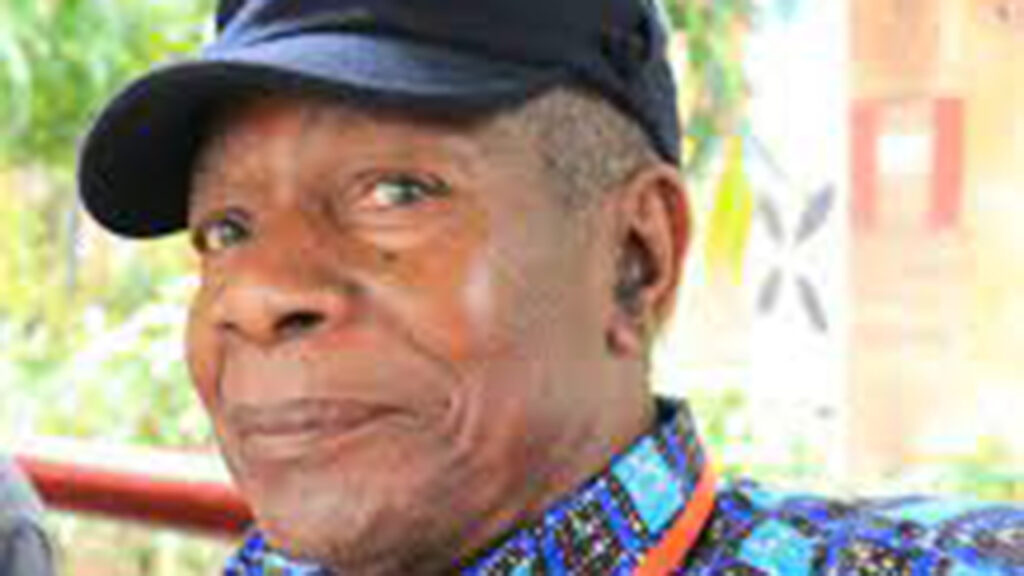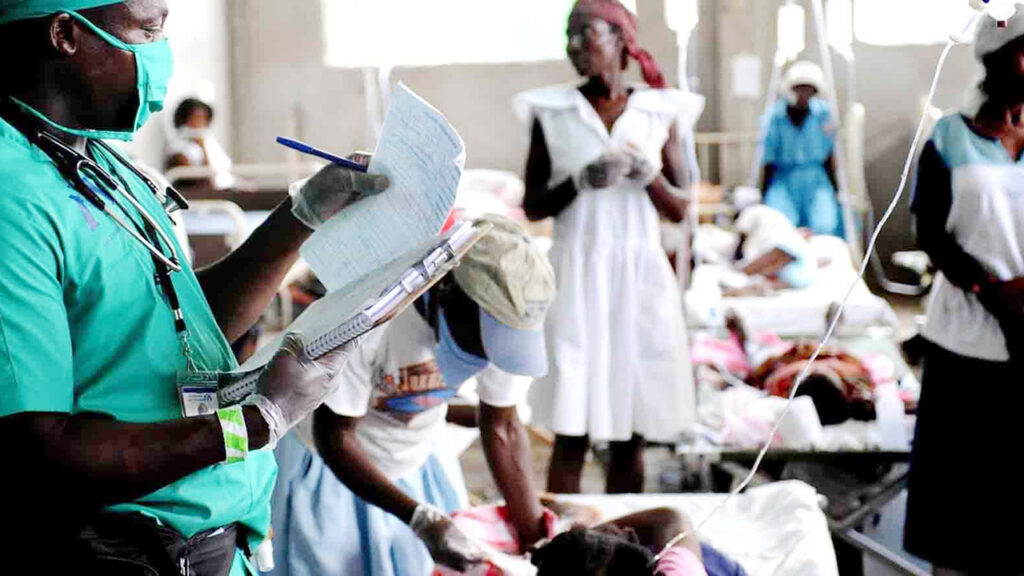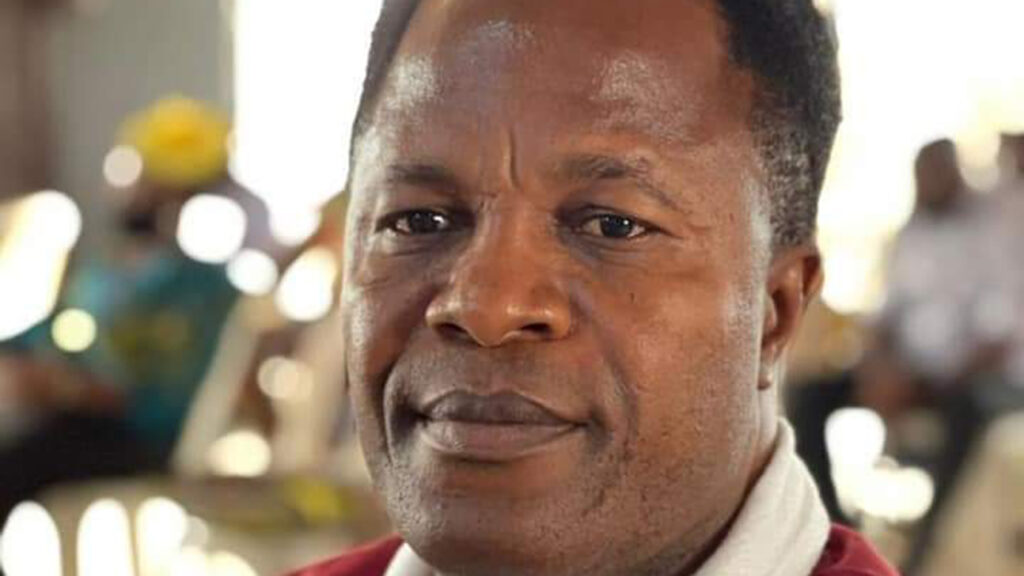
Ajegunle, a slum in Lagos metropolis, is not only home to over a million people, but depicts the wide gap between the rich and the poor in Nigeria. Changing the narrative of the residents, including the indigent children, is a daunting challenge that one Patrick Mbamarah is struggling to tackle. TOBI AWODIPE takes a look at the Mbamarah’s innovative solution, which involves preserving the environment and educating out-of-school children.
It is no secret that Nigeria has a high number of out-of-school children in the world, and that rising poverty and unrest are driving this number up daily.
A 2022 report by the United Nations Educational, Scientific and Cultural Organisation (UNESCO) noted that about 20 million Nigerian children are out of school. This amounts to 20 per cent of Nigeria’s population of approximately 200 million people and is more than the overall population of many countries in Africa.
Lagos, Nigeria’s economic hub and one of the highly populated cities in Africa, is one of the places where the problem of out-of-school children is more pronounced. Just last year, Chairperson of the Lagos State Universal Basic Education Board (LASUBEB), Wahab Alawiye-King, said the state had over two million out-of-school children, with a lot of them in dire need of protection from daily violence, abuse, neglect, exploitation and exclusion.
Ajegunle, popularly known as “AJ City”, is a sprawling, densely populated neighbourhood located in the heart of Lagos under the Ajeromi-Ifelodun Local Council Development Area. The story of Ajegunle is paradoxical, because in Yoruba language, it means ‘a place where riches dwell’, however, most of the inhabitants of the community are very poor and survive on less than N1000 daily. Also, Ajegunle is a community bordered on the west by Apapa Wharf and Tincan, two of Nigeria’s big seaports through which over 70 per cent of imported goods enter into the country, and yet, most of its residents struggle to make ends meet.
The slum, with a population of less than a million residents made up of citizens from the various ethnic groups in the country, has produced many notable people, one of which is Patrick Mbamarah.
For years, many artistes have made songs about the community, comedians have made jokes about the inhabitants and the grinding poverty of the residents, but not much has changed for either the environment or its inhabitants. They still grapple with the old problems of refuse, high number of out-of-school children due to poverty and inadequate or non-existent infrastructure.
Born and raised on Iyalode Street, Ajegunle Boundary, Mbamarah has never lived outside the street except when he went to the South East zone for his higher education. He says he has no desire to, as he loves Ajegunle, the people and what it represents. However, the problems are glaring and they make him sad. He said many of the people he grew up with succumbed to a life of crime in a bid to make ends meet. According to him, the place receives little or no government attention and the problems of refuse and out-of-school children idling away always sadden him.
Soon after he finished his youth service and returned to Ajegunle over a decade ago, Mbamarah was shocked to observe that most of the problems he encountered while growing up were still persisting and he resolved to tackle some of them. Armed with his passion for recycling waste products and education, he started recycling nylon, especially sachet water nylons (a.k.a pure water) nylon, which he said were everywhere, and even blocking the few drainages after any downpour.
“The streets are poorly planned as you can see and structures spring up without regulations, so whenever it rains, the few available drainages are filled with nylon, bottles, foam, containers and all other manner of refuse. I started picking those nylons up, washing and packing them for sale. It was while I was doing it that I noticed that so many children were not going to school and when I dug deeper, I discovered it was due to lack of funds.
“This realisation saddened me and since I was passionate about teaching and education, I decided to start a low-cost school. That was how Morit International School (a.k.a Green Minds Academy) was born,” he said.
Soon after, Mbamarah ran into his first problem. “Originally starting off as a profit-making school in 2013, I realised very quickly that many parents still could not pay their ward’s fees. After a term, I did a price slash but even with that, many could still not pay the fees. Most people here are extremely poor, they don’t spend more than N500 to feed a family of four. Paying fees was almost a luxury they could not afford.
“This got me thinking on what to do. I did not like it that the children’s fees were not paid and I could not send them home either. I just didn’t have it in me and I felt guilty though I knew I was not doing anything wrong,” he told The Guardian.
Mbamarah, who is fondly called Morit, is a graduate of Pure and Industrial Chemistry from the Imo State University (IMSU), Owerri, and armed with knowledge about polymers, plastics, petroleum and related projects, he decided to put it into recycling of sachet water nylons.
A year before going into the business, he picked pure water nylon for a recycling company in Ikorodu, Lagos State.
“I picked pure water nylons from around, anywhere I saw the nylons, I picked them up and brought them home. Then, I would wash, dry and bag them and sell them to the recycling company that shreds and turn them into pallet form.”
He said recycling was not popular then but he knew that money could be made from recycling plastic and paper, and so, he encouraged parents to take it up as well. The idea gave birth to the Recycles Pay Educational Project.
“I had a meeting with the parents, explaining my vision to them. Most of them embraced it and got on board. I knew recycling would work, I had experience doing it but I didn’t know how to go about it and decided to partner with one company and we kicked things off.”
Despite that, Mbamarah was still faced with challenges, as some parents did not agree to bring bottles in lieu of school fees, saying they wanted to pay the fees. Not discouraged, he went ahead encouraging them to bring plastic bottles and empty cartons, no matter how small, whenever they could. This, he said, would go into taking care of the fees of other children whose parents could not meet up.
The school acted like the middleman while the parents were the pickers selling to any company that could offer him the best deal in terms of price and logistics. “The company that we work with presently, Scrap Pay, has ready-made logistics in place and that is why I am working with them to spread our tentacles outside Ajegunle and Olodi-Apapa.”
Morit said he did not limit the parents to just plastic bottles but any scrap item that can be sold, including old furniture, electronics, wires, copper, paper, plastic of any kind and metal. “Anything they bring, we will help them sell and when we do, we let them know how much it sold for and put it against their ward’s fees. We recently had a parent (name withheld) that paid up her child’s fees totally and still had leftover, just from bringing in plastics. She asked me to give her the balance so she can use it to prepare food for the house but I refused, reminding her that the money was strictly for educational purposes, including her child’s stationeries.”
Part of Mbamarah’s vision is to ensure that no parent cites lack of funds as reason their children are not in school.
“Everyone should be able to attend a community school at least. Books, uniform, socks, writing materials and so on are sold by the school to parents but because many could still not afford these items, I got some friends to donate materials to them, including the white boards they use, exercise and text books and other writing materials.
“But I have a limit and when the donations run out, I have to tell the parents that they need to buy. I allow them to pay in installments, as little as N200, till the money is complete. We don’t use profit to sell the uniform, we sell at N2, 500 and most of our parents still struggle to pay this. There was a time I shared 200 pieces of uniform free of charge from my pocket because I knew the parents were struggling. After I exhausted this, some of my friends donated money and materials, taking the number of donated uniform to over 300,” Mbamarah said.
Accommodation is another major problem he faces. The learning centre has a pre-school section, primary and secondary arms with the secondary arm in a different location. They have been asked to leave the building as they cannot pay rent. The landlord has asked them to vacate immediately. “Money is a big issue right now as you can guess. We can’t afford to keep our teachers on full-time basis so they teach on part time basis but I beg them to give their best despite the limited time they spend with us. We have a schedule for them, especially the Maths, English and phonics teachers who come thrice a week. Maths and English teachers are very difficult to get and keep because those are core subjects and they tell me that coming three times weekly is too much for them. I am begging the National Youth Service Corps (NYSC) to send corps members to us as this would help us greatly.”
When it is time to write external examinations, Mbamarah would merge the children with bigger schools, as they are not capable of standing on their own yet. “Sadly, it takes a parent here an average of six months to finish paying for their ward’s external exam fee (N10, 000). They pay in installments. I help them keep the money till it is complete and I go pay. The economy is tough and most people here are poor. A year or two ago, many families here used between N500 and N1000 to make a small pot of soup and eba to eat, but now, they need about N3, 000 to make that same quantity of soup and eba. We know that food, shelter and clothing are the most important things in the scale of preference, and education usually suffers the most when money is low. Most people here are poor and their income is not increasing. I understand what they are going through, I live here with them and see what they are passing through. I know some parents don’t care, but the parents we have here do care for their children, but they really are just very poor.”
The pre-school fee is N6000; primary, N7, 000; 13, 500 for junior secondary and N15, 000 for senior secondary. But despite the low fees, many of them can still not meet up. “From primary 4, I start teaching the children to be environmentally responsible and I am proud that they are all embracing it well.”
On his efforts at getting partnership and support, Mbamarah said: “I have written and spoken to many recycling companies for support but nothing has come out of my efforts yet. My vision is to make this a proper community school where plastic bottle donations from all and sundry keeps the school running even without them knowing it.
“I have approached the chairman of Ajeromi-Ifelodun Local Council Development Area for vehicles and space with no luck. We just need a space where we can collect and buy the plastics from the community and the proceeds will be used to develop the school and keep the students. Even if it is a tricycle, I will use it to mop up the plastics. Taking the plastics to the company is better than them coming to collect from you. We get paid better when we take it to them. Logistics is key in recycling. If I am taking it to them, I can sell a kilogram (21 bottles) for N200 or N250 if it is sorted, cleaned and white but when they come here to buy from us, they buy at N39 per kg.”
Mbamarah told The Guardian that though he had been given a space at the town, he needed to secure it with N50, 000. “Even with that, logistics still remain our biggest problem. I can’t pay for the space yet because I don’t have the logistics in place for moving the plastics. We need collection points in every street ideally, but Ajegunle is unplanned and very tight. There is no space anywhere so we need a vehicle to go round, picking up the bottles. This will encourage more people to key into this vision faster. I don’t want to tell people to keep the bottles when I don’t have the means to collect the items from them. Logistics is the major obstacle preventing me from expanding the school the way I want to.
“I dream of a proper structure complete with a library, playground, computer and music lab, Montessori room and so on. The price of our fees would not go up. I am not looking at making profit, and to the glory of God, my needs are being met.
“My joy is seeing a child that was brought as a baby, knowing nothing, being able to read, write and converse fluently in a few years time. Everything I make from recycling goes back into maintaining the school. People give me money sometimes but I find myself still pouring everything back into the school and its maintenance.”
He said he discovered his love for teaching while serving in Sokoto State and was even employed by the Sokoto State government after he finished his service. “I redeployed to Lagos to escape the Boko Haram attacks happening in the north then and was told that I had to go back as I had been employed by the state government as a teacher. I insisted that I didn’t apply but what I didn’t know then was that the children I taught had told their parents about me and how much they enjoyed the way I taught them. The principal refused to let me go and it took over two weeks of pleading with him before he let me go.”
After his youth service and waiting for a good job that never came, Mbamarah started Morit. “I have no intentions of doing anything else, teaching and protecting the environment through recycling is what I want to do full time.”
He revealed that his dream is to have a standard school that comes at a very minimal cost to the children in Ajegunle. “I want to see our graduates competing fairly in every area with graduates of more elite schools. I don’t believe in giving scholarships to brilliant children alone as I think everyone has the right to be educated. Some students that were not really doing well in school then are thriving in business today, so why did we exclude them from opportunities or shame them? The child doing well then is a teller in a bank or even unemployed while the one that was taught won’t amount to much has found their calling outside education.
“I give scholarships and opportunities to the child that is struggling education-wise because everyone needs to know how to read and write properly. That child should be encouraged so that in future, they can be better than what he/she thought they could be.”
Mbamarah has a plan to serve his community and any community that looks like his as he can relate to their stories, struggles and connect with them easily. “I grew up seeing a lot of cult activities, drugs abuse, fighting and other vices but I was able to rise above all that and get education. I want to show these children that it is possible to be successful despite the circumstances around us here.”
So far, about 490 children have gained or are currently gaining from this initiative since he started, most of whom would never have had the opportunity to get education.
A teacher at a private school very close to Morit International, who did not want to be named, said the initiative was a laudable one and was helping to get many children away from crime and off the streets. She added that most of them inadvertently tried to support with donations, encouragement and little ways to make operations easier for the small school.
Murja Musa, a single mother of three children and a struggling hairdresser is forever grateful to Mbamarah, whom she said had given her children the gift of education. Originally from Kano State, her husband brought her to Lagos, promising to take care of her but suddenly left the house one day after the birth of her last two children, a set of twin boys. He left to marry someone else and has several wives now.
Murja said she was no longer getting support from her husband and he was not picking her calls again. Speaking in Yoruba, which she is now almost fluent in, she said she heard about the school from a customer and decided to try it out. That was six years ago and she said it had given her a lifeline.
Living on less than N1000 daily, she has to fend for three children on her own and pay their school fees.
“My first son, Abdulrahman started with Mr. Mbamarah when he was a baby, now he is going to primary 3. The twins, Abdulmaleek and Abdulazeez are in kindergarten and heading to primary 1 now. I pray God continues to uplift and keep him because without him, I don’t know what many of us would have done. I cannot even afford government school for them because of all the small fees we were asked to pay. To get everything here almost for free in exchange for plastics and paper is almost too good to be true.” The children speak well and are thriving in their studies.
Another parent of one of Mbamarah’s students, who spoke on the condition of anonymity, applauded what he was doing. “These days, picking bottles and papers to take to the school is like second nature to me and I am sure it is like that for others. My daughter is being educated for almost next to nothing for me and we are trying to keep this place clean. It is a win-win in my opinion,” she said.
As the initiative is solving problems in Ajegunle community, Mbamarah said might not see results immediately but he was content to keep sowing the seeds that would germinate in a few years time. “I may not be appreciated now and some people think I am weird now but when my graduates start making us proud with their exploits, people will start telling my story and appreciating me. There is still refuse around us and many children are still out of school but I will keep trying to do my best and encourage my students to bring in their friends into the initiative, everyone is welcome.”
Mbamarah, who is still without any means of collecting the materials for recycling and is struggling with logistics, needs help. “Getting our own property will be nice too as sourcing rent has always been a major problem. There is a huge responsibility on my shoulders and getting rent out of the way will be a great relief. Right now, we use boards to demarcate the different arms and when it rains, water gets into our building through the roof, windows and back door. All these don’t deter me, to be honest, it just makes me more determined to continue to do better for them and for myself. It is my dream that people around here will be able to pay at least two children’s fees from simply donating plastics and old materials to us, helping to educate more children, not just in this axis alone but in other poor areas in Lagos,” he said.
*This story has been supported by Nigeria Health Watch through the Solutions Journalism Network, a nonprofit organisation dedicated to rigorous and compelling reporting about responses to social problems.













